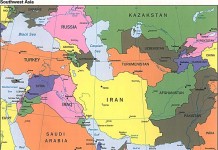Context
 Pakistan’s President Asif Ali Zardari travelled to China’s restive Xinjiang province on August 30th for a regional tour as well as for the China-Eurasia Expo held at Xinjiang’s capital Urmuqi. On September 2 he was in Dushanbe, Tajikistan’s capital for a high-level meeting with the Russian, Afghani and Tajik Presidents. Pakistan is aggressively pursuing linking up with the Eurasia trade and energy corridor and these visits are laying the foundation for that vision. However, the peace and stability in Afghanistan is essential if these dreams are to come true.
Pakistan’s President Asif Ali Zardari travelled to China’s restive Xinjiang province on August 30th for a regional tour as well as for the China-Eurasia Expo held at Xinjiang’s capital Urmuqi. On September 2 he was in Dushanbe, Tajikistan’s capital for a high-level meeting with the Russian, Afghani and Tajik Presidents. Pakistan is aggressively pursuing linking up with the Eurasia trade and energy corridor and these visits are laying the foundation for that vision. However, the peace and stability in Afghanistan is essential if these dreams are to come true.
Analysis
China-Eurasia Expo 2011
With the fasting month of Ramadan over, President Zardari spent Eid celebrations abroad as he embarked on his seventh visit to China since coming to office in 2008. Zardari was touring the Xinjiang region of China, which borders Pakistan and was the first foreign head of state to visit the region’s capital, Urmuqi.
Urmuqi was playing host to the China-Eurasia Expo, which the President attended and which set the theme for his visit. Zardari met with numerous trade leaders to discuss increased business ties with Pakistan on numerous fronts, with the energy sector a key area of interest. Zardari also used the visit to air his hopes that one day China and Pakistan could enjoy passport-free movement of people between the two countries, comments which, according to Chinese media reports, were vetted and approved by Beijing before Zardari uttered them.
Zardari was equally keen to push for Pakistan to stand as an energy corridor for China, providing a gateway for energy resources, namely crude oil and gas to flow from Pakistan into China. Pakistan offers a number of possible avenues for funneling energy into China, through its ports as well as over land in pipelines or by rail.
President Zaradri supported road-rail-air networks connecting Pakistan’s northern areas with Xinjiang and energy (oil and gas pipelines) and communication (fiber optic) corridors between Pakistan and China connecting Shanghai to Urumqi to Gwadar to the Strait of Hormuz.
“These new economic arteries will transform the destiny of the region and usher in a new period of peace and stability”, he stated.
While Pakistan is placed in a very geo-strategic position for providing China with energy resources, all options are as yet prospective because of regional security issues as well as internal instability in Pakistan. However Zardari made it clear to China that he wants China to see Pakistan as a viable option, which necessitates a greater investment by China in Pakistani infrastructure and in regional security issues to provide a stable platform for delivery of energy.
Pakistan and China have a mutual interest in stability in the region, particularly as Xinjiang province has been plagued by a low-level insurgency from elements of its Muslim Uyghur population, with accusations that militants from the Uyghur insurgency have trained in camps in Pakistan. Despite this underlying tension, Zardari expressed his dismay to the Chinese media over terrorism in Xinjiang, saying that the violence has pitted “neighbors against neighbors and friends against friends,” perhaps alluding to the neighborly dispute over the issue between China and Pakistan as well as within Xinjiang itself.
The Dushanbe Four
Following his visit in China, Zardari met with Russian President Dmitri Medvedev, Afghan President Hamid Karzai and Tajik President Emomali Rakhmon in Dushanbe on September 2, for a meeting of the so-called “Dushanbe Four.”
Hot on the agenda in Dushanbe was the issue of Afghanistan’s security as the US continues its phased withdrawal from the country. In two separate press conferences, Medvedev stressed that the security of Afghanistan and the greater region had to be dealt with by countries in the region, and that the US should focus the remainder of its time in Afghanistan on training and readying Afghan security forces so they are able to “provide for the defense capabilities of the state, and combat extremist groups and drug traffickers.” He further stated that “Responsibility for everything that happens and will happen in the region … will lie with our countries – Russia, Tajikistan, Pakistan and Afghanistan.”
The focus on regional control has been growing stronger, especially since the SCO meeting held earlier in the year. While the fallout from the Arab Spring was the main topic of discussion at the SCO meeting, most notably how to contain its spread so that Central Asia remain unaffected, the angle of focus was clearly on ways to strengthen regional ties to contain unrest, and Medvedev’s sentiment that security in Afghanistan was a concern for the region as expressed in Dushanbe was reminisce of similar comments made at the SCO.
The four leaders also discussed the possibility of gas pipelines that traversed their countries and the region, as well as a possible rail line.
Pakistan, Afghanistan and Tajikistan especially welcomed Russia’s interest in a gas pipeline project across the countries and the leaders of the four countries called for accelerated construction of the CASA-1000 power project. President Medvedev stated Russia was ready to invest “hundreds of millions of dollars” into the CASA-1000 project to send power from Tajikistan to Kyrgyzstan, Afghanistan and Pakistan. “But for it to happen, necessary organisational decisions should be taken first, we have to be invited,” Medvedev told reporters.



